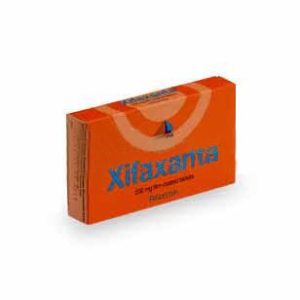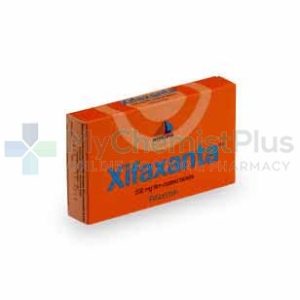Showing the single result


£30.50Traveller’s diarrhoea is diarrhoea that develops during, or shortly after, you have travelled abroad. Diarrhoea is defined as ‘loose or watery stools, usually at least three times in 24 hours’. Traveller’s diarrhoea is commonly caused by eating food or drinking water containing germs (bacteria). In most cases, the symptoms are mild, and the body’s immune system clears them within a few days. Rifaximin is an antibiotic which works within the gastrointestinal system.
It is not absorbed into the body (this means that it is not suitable to treat other types of infection). You may be advised by your doctor to take a supply with you when you travel, ‘just in case’ you develop diarrhoea. You will be prescribed a brand called Xifaxanta®. The tablets are not suitable if you also have a high temperature (fever) or if there is blood in the diarrhoea – you should get medical assistance as soon as possible in these cases. Rifaximin should not be given to children.
Always read the leaflet that is in the packet of Xifaxanta. Things such as precautions and possible side-effects vary between traveller’s diarrhoea medication.
End of content
End of content
Holidays are always fun and exciting to look forward to. You would usually want to share your holiday snaps and stories when you are back from your travels, but there are some things you may not always plan, which is becoming unwell.
There are lots of things which can cause you to become unwell whist you’re travelling, particularly if you travel to an area of poor hygiene. Traveller’s diarrhoea is a common disorder which affects the digestive tract and can cause frequent loose bowels. Other symptoms can also include fever (high temperature), vomiting and abdominal cramps. This can be caused by eating foods and drinking water which may be contaminated with bacteria and other parasites and viruses. It can also be spread through contact with an infected person or if you touch a contaminated object.
Traveller’s diarrhoea usually occurs within 10 days of travelling to a contaminated area and can cause you to have three or more loose stools in a space of 24 hours. Symptoms can usually go away by themselves in a few days and are often not a cause for concern. You should always try and stay hydrated by drinking plenty of fluids to avoid any dehydration.
Overall, traveller’s diarrhoea is not a pleasant experience and you may need additional treatment in the form of antibiotics to help you get better. We can offer antibiotics which specifically work within the gastrointestinal system. These can be taken if you develop traveller’s diarrhoea, or you may also want to consider taking a supply with you on your travels in case you develop symptoms whilst you are away.


